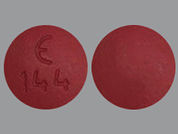Demeclocycline Hcl
Demeclocycline Hcl
What is Demeclocycline Hcl used for?
Demeclocycline is used to treat a wide variety of bacterial infections, including those that cause acne. This medication is known as a tetracycline antibiotic. It works by stopping the growth of bacteria. This antibiotic treats only bacterial infections. It will not work for viral infections (such as common cold, flu). Using any antibiotic when it is not needed can cause it to not work for future infections.
CHEMICAL NAME
DRUG TYPE
Demeclocycline Hcl Prices
Searching for the lowest prices
What does Demeclocycline Hcl look like?
View all Demeclocycline Hcl Image Information (4)Demeclocycline Hcl Frequently Asked Questions
See also Side Effects section.
Before taking demeclocycline, tell your doctor or pharmacist if you are allergic to it; or to other tetracycline medication (such as doxycycline, minocycline, tetracycline); or if you have any other allergies. This product may contain inactive ingredients, which can cause allergic reactions or other problems. Talk to your pharmacist for more details.
Before using this medication, tell your doctor or pharmacist your medical history, especially of: kidney disease, liver disease, problems swallowing, esophagus problems (such as esophageal ulcers, hiatal hernia, acid reflux disease-GERD), lupus, a certain hormone imbalance called "water diabetes" (diabetes insipidus).
This drug may make you dizzy. Alcohol or marijuana (cannabis) can make you more dizzy. Do not drive, use machinery, or do anything that needs alertness until you can do it safely. Limit alcoholic beverages. Talk to your doctor if you are using marijuana (cannabis).
Demeclocycline may cause live bacterial vaccines (such as typhoid vaccine) to not work well. Tell your health care professional that you are using demeclocycline before having any immunizations/vaccinations.
This medication may make you more sensitive to the sun. Limit your time in the sun. Avoid tanning booths and sunlamps. Use sunscreen and wear protective clothing when outdoors. Get medical help right away if you get sunburned or have skin blisters/redness.
Before having surgery, tell your doctor or dentist about all the products you use (including prescription drugs, nonprescription drugs, and herbal products).
This medication should not be used by children younger than 8 years of age because it may cause permanent tooth discoloration and other problems. Tooth discoloration has also occurred in older children and young adults. Consult your doctor for more information.
Tell your doctor if you are pregnant or plan to become pregnant. You should not become pregnant while using demeclocycline. Demeclocycline may harm an unborn baby. If you become pregnant, talk to your doctor right away about the risks and benefits of this medication.
This medication passes into breast milk. Consult your doctor before breastfeeding.



